At Cannes: Movieline Handicaps the 2010 Palme d'Or
No films in competition at this year's Cannes Film Festival look to be breakouts, thus, picking the winner of the prestigious Palme d'Or is a huge challenge. Have no fear, Movieline is up to the task at hand.
Near the end of last year's festival, it was clear the winner of the Palme D'Or was either going to be Jacques Audiard's A Prophet or Michael Haneke's The White Ribbon. The latter took home the top prize; by and large critics were in agreement. This year, however, divergent opinion among the "criterati" means this year's winners will likely hew toward jury president Tim Burton's quirky sensibility. Below is my Las Vegas-style odds on which film will take the Palme -- and some analysis on the fest's other awards.
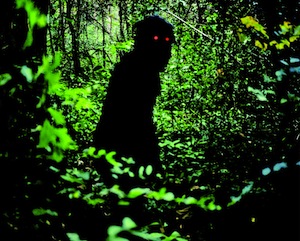 · Uncle Boonmee Who Can Recall His Past Lives, directed by Apichatpong Weerasethakul
· Uncle Boonmee Who Can Recall His Past Lives, directed by Apichatpong Weerasethakul
The Thai filmmaker -- known to many as "Joe" (you try pronouncing his name) -- is a critics' darling, in the same camp as Hou Hsiao-Hsien. In fact, the more pretentious the critic, the more he or she will usually champion Joe's films. That aside, this film is by far his most coherent and accessible -- though not coherent enough for me to even begin to plot it out successfully. Amid some excellent scenes -- Monkey Ghosts with piercing red laser eyes; a catfish who performs cunnilingus on a princess swimming in a creek -- the film (kind of) tells the tale of a dying man living in a remote forest who's visited by a series of ghosts. Weerasethakul probably had Tim Burton at Monkey Ghosts. That mixed with critical adulation is looking like gold.
ODDS: 3 to 2.
· Another Year, directed by Mike Leigh
Leigh's searing portrait of a depressed, middle-aged woman who smothers the lives of a proper British family seems destined to win something. Lesley Manville looks poised to win an acting award, but the Palme? Yes, if the critics voted. Also, Leigh could get the nod for Best Screenplay.
ODDS: 3 to 1.
· Biutiful, directed by Alejandro González Iñárritu.
Championed more by foreign press than U.S. press (what can be drawn from that is a mystery), Iñárritu's at-times overwrought, multi-layered look at one man's struggle to keep his shit together against cancer has a decent shot at the Palme -- despite the initial excitement for the film waning. Best shot for an award? Bardem for acting.
ODDS: 4 to 1.
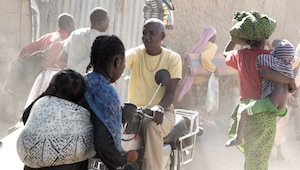 · Un Homme Qui Crie (A Screaming Man) directed by Mahamat-Saleh Haroun.
· Un Homme Qui Crie (A Screaming Man) directed by Mahamat-Saleh Haroun.
I get it. It's a tough festival. Half the competition films this year would barely make it into a sidebar competition in a good year. Thus, critics are dying to find something small in which they can tout. They've seemingly found it with Haroun's ultimately flaccid film about a pool attendant who loses his job in a Chad hotel. An utterly fine film at best, but the critical groundswell may vault this film to a Palme. Maybe.
ODDS: 8 to 1.
· Copie Conforme (Certified Copy) directed by Abbas Kiarostami.
A dialectic more than a film, it pits Juliette Binoche and "that other guy" (as the press has been referring to him) musing on relationships and forcing viewers to question the differences between a copy and an original. Kiarostami won before for 1997's Taste of Cherry -- a much better movie. Could muscle in, but seemingly the kind of film Burton would hate. He may be forced to give it something, and the Jury Prize -- second place -- might be just the ticket.
ODDS: 10 to 1.
· 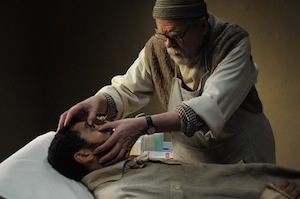 Des Hommes et Des Dieux (Of Gods and Men), directed by Xavier Beauvois.
Des Hommes et Des Dieux (Of Gods and Men), directed by Xavier Beauvois.
In the 1990s, a group of Cistercian monks in Algeria were beheaded by Islamic extremists. With a heavy hand, Beauvois's film chronicles their murders. Remote chance that the always-excellent Michael Lonsdale picks up an acting award.
ODDS: 14 to 1.
· Route Irish, directed by Ken Loach.
A late entry to the festival, Loach -- who was at Cannes in ’09 with Looking for Eric (and won the Palme in 2006 for The Wind That Shakes the Barley) -- remains a festival favorite. But this film, about a British soldier investigating his friend's death, feels slight despite some convincing performances. Loach had a better shot last year.
ODDS: 15 to 1.
· Poetry, directed by Lee Chang-dong.
In Korean director Lee Chang-dong's film, a 66-year-old woman copes with the onset of senility and delves deep into writing as her only form of therapy. Tough to see this getting the Palme, but actress Yung Jungee's performance as the woman has been all the talk at Cannes. She's the favorite to win the acting award. But the Palme for the film? Nope.
ODDS: 16 to 1.
· Tournée (On Tour), directed by Mathieu Amalric
Well, the French love it, but the rest of the critics shrugged their collective shoulders at Amalric's portrayal of a French man who takes a gaggle of American burlesque performers on the road in France.
ODDS: 18 to 1.
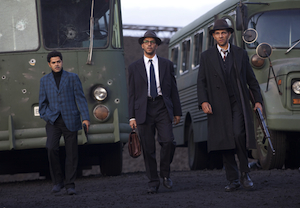 · Hors La Loi (Outside of the Law) directed by Rachid Bouchareb
· Hors La Loi (Outside of the Law) directed by Rachid Bouchareb
More Hollywood than Cannes, this film -- described by many critics as conventional -- tells the story of the Algerian war for independence and how the evil French colonialists went gangsta on the Algerians. Conventional films rarely win the Palme D'Or, but this film makes a grand, sweeping political statement -- its only hope for a Palme.
ODDS: 19 to 1.
· Outrage, directed by Takeshi Kitano.
Kitano's ultra-violent thrill ride is the best film he's made since Sonatine, but, alas, many critics loathed it. And it's really not the kind of film Cannes juries care about.
ODDS: 21 to 1.
· La Princesse De Montpensier (The Princess of Montpensier), directed by Bertrand Tavernier.
Generally viewed among critics as "fine," "okay," "not horrible," the period-piece tells the tale of a love affair in France during the reign of Charles IX. The film's a tough slog, with about 4,000 characters introduced in the first 20 minutes.
ODDS: 27 to 1.
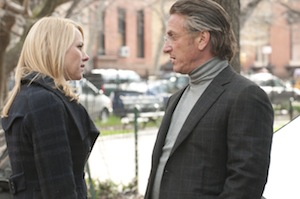 · Fair Game, directed by Doug Liman.
· Fair Game, directed by Doug Liman.
One of the biggest disappointments of the festival. A soulless, pointless look at the Valerie Plame affair. Really excellent movie -- for people who were in coma from 2002 through 2010.
ODDS: 28 to 1.
· The Housemaid, directed by Im Sangsoo.
A morality tale on how wealth corrupts in Korean society, Im Sang-soo's film had few critics on its side -- despite a pretty excellent finale.
ODDS: 30 to 1.
· Chongqing Blues, directed by Wang Xiaoshuai.
An estranged father questions those involved in the shooting of his son, who took a woman hostage in a Chinese mall -- paced oddly and plotted poorly.
ODDS: 31 to 1.
· La Nostra Vita (Our Life) directed by Daniele Luchetti.
With a promising opening and a few great scenes, Luchett's brief glimpse into the life of an Italian construction worker left to care for his three kids when his wife dies felt like half a movie. After this one screened, the critics buried it deep in the bowels of construction site.
ODDS: 34 to 1.
· My Joy, directed by Sergei Loznitsa.
Sergei Loznitsa's portrait of the violent side of Russian life, where cops and the military act like Gestapo thugs, puzzled most critics, despite some well-directed and searing segments.
ODDS: 36 to 1.
· Burnt by the Sun 2, directed by Nikita Mikhalkov.
Gluttonous sequel to 1994's Grand Jury Prize-winning film, Mikhalkov's latest picks up where the first one left off -- war-torn Russia in the 1940s. A sequel, winning a prize at Cannes?
ODDS: 39 to 1.
· Tender Son -- the Frankenstein Project, directed by Kornél Mundruzco
Often, a film screening later in the festival turns up as a winner -- except at this year's festival. Screened for the critics last night, the infuriating film tells the story of a hateful teenager and his dysfunctional family. It's one of those rare films that accomplished nothing.
ODDS: 53 to 1.

Comments
"Monkey Ghosts with piercing red laser eyes; a catfish who performs cunnilingus on a princess swimming in a creek..."
It has my vote.
Dude, Cannes was totally amazing this year. Better than usual.
Lou
http://www.complete-anonymity.at.tc